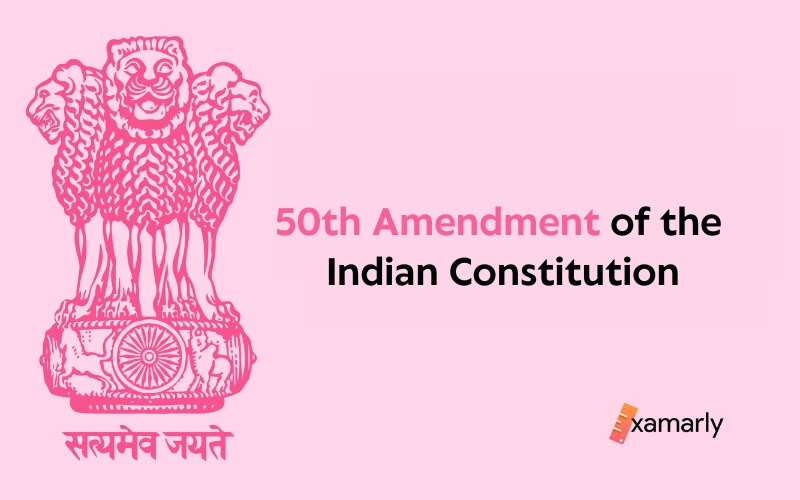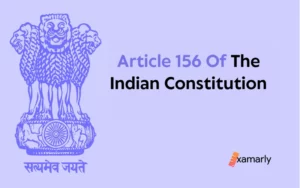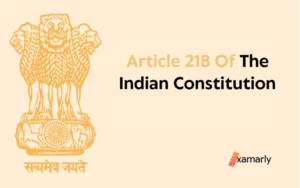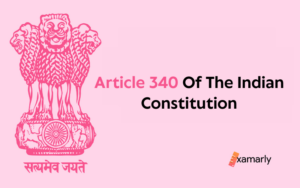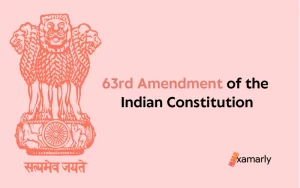The Indian Constitution is one of the world’s longest-written constitutions and has undergone several amendments since it was first adopted in 1950. Each constitutional amendment has been made with the intention of improving the functioning of the Indian government and ensuring the protection of its citizens’ rights.
The 50th Amendment of the Indian Constitution is one such amendment that was passed by the Indian Parliament in 1984. In this blog post, we will dive deep into the 50th Amendment of the Indian Constitution, its background, objectives, and its impact on the Indian polity.
We will also explore the key provisions of the amendment and their significance in shaping India’s political landscape to facilitate your UPSC preparation.
- 50th Amendment of the Indian constitution: Explained
- Statement of Objects and Reasons
- Important Provisions
- Conclusion
- FAQs related to the 50th Amendment of the Indian Constitution
- In which year was this amendment act passed?
- When was the purpose behind the enforcement of this amendment act?
- Who introduced the Statement of Objects and Reasons for this amendment act?
- When was the 50th Amendment of the Indian Constitution enacted?
- Which amendment bill was attached to the Statement of Objects and Reasons?
50th Amendment of the Indian constitution: Explained
The 50th Amendment of the Indian Constitution is officially referred to as The Constitution (Fiftieth Amendment) Act, 1984.
The 50th Amendment dealt with the substitution of Article 33 of the Indian Constitution.
Parliament has the power to create laws under Article 33 of the Constitution that restricts or revoke the rights granted in Part III of the Constitution when applied to the armed forces or public order forces.
This is necessary to ensure that these groups perform their duties properly and maintain discipline. The article recognizes that certain restrictions may be needed for specific roles.
It was suggested that Article 33 needs to be amended.
In the thirty-fifth year of the Republic of India, Parliament enacted the 50th Amendment of the Indian Constitution. It came into effect on September 11, 1984.
Also Read: 49th Amendment of the Indian Constitution
Statement of Objects and Reasons
Article 33 of the Constitution allows Parliament to create laws that limit or cancel some of the rights granted in Part II of the Constitution when they apply to the Armed Forces or public order forces.
This is necessary to ensure that these groups render the proper discharge of their duties properly and maintain discipline. The article recognizes that there may be limitations required for certain roles.
The Act provides an amendment to Article 33 and hence gets within its scope:
- the members of the Force tasked with the protection of property belonging to, charged with, or under the control of the state;
- anyone working for any bureau or organization created by the government for intelligence or counter-intelligence purposes; or
- those working for or in conjunction with telecommunications networks established for any force, bureau, or organization.
Experience has shown us that maintaining discipline among them and ensuring the performance of their jobs is crucial for the good of the country.
Important Provisions
The 50th Amendment of the Indian Constitution has several important provisions. It primarily focuses on technical modifications to Part III’s limitation over fundamental rights, which are required under Article 33 and cover security personnel who guard property and communication equipment.
The Constitution has a new article that allows Parliament to create laws about how the rights in Part III apply to people in certain positions, such as those in the Armed Forces, law enforcement, or espionage-related departments.
This means that the scope of these rights can be limited in their application to these groups. The article recognizes that there may be specific considerations and limitations that need to be taken into account for certain roles.
The telecommunication techniques put up for any Force, bureau, or institution directed to above, be limited or annulled to provide the proper, discharge of their duties and the maintenance of discipline among them.
You Might Also Like: 51st Amendment of the Indian Constitution
Conclusion
The 50th Amendment dealt with the modification of Article 33 majorly. The Act has been amended to include employees working for the State for purposes of intelligence and counter intelligence bureaus, as well as those hired for telecommunication systems related to any Force, bureau, or organization.
This amendment was made to ensure that employees perform their duties properly and maintain discipline. The amendment recognizes the importance of maintaining proper performance and discipline in these organizations.
This amendment ensured the implementation of a crucial change in the history of the Constitution of India.
FAQs related to the 50th Amendment of the Indian Constitution
In which year was this amendment act passed?
The 50th Amendment Act of the Indian Constitution was passed in 1984.
When was the purpose behind the enforcement of this amendment act?
The 50th Amendment Act was passed to amend Article 33 of the Indian Constitution.
Who introduced the Statement of Objects and Reasons for this amendment act?
P. V. Narashimha Rao introduced the Statement of Objects and Reasons for this amendment act.
When was the 50th Amendment of the Indian Constitution enacted?
This amendment was enacted on September 11, 1984.
Which amendment bill was attached to the Statement of Objects and Reasons?
The Constitution (Fifty-second Amendment) Bill, 1984.


